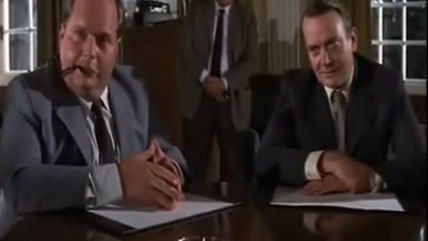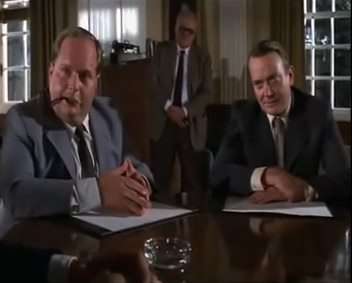Our Scary Technocracy
There are no "top men" and there never will be


Did President Barack Obama and the White House really not know that the National Security Agency was monitoring dozens of world leaders and had been for years? Or is he deliberately shielding himself from uncomfortable diplomatic fallout from angry European peers and from criticism about the extent of America's surveillance activities?
Did the president really not know that hundreds of thousands of Americans in the individual insurance market would lose their coverage as a consequence of the Affordable Care Act's requirements? Did he know that his claim that people would be able to keep their health coverage if they liked it was not true and actually never was? Or was this a planned deception all along in order to reduce resistance by those whose policies were going to be negatively impacted?
Which answer is worse? For the average American, either answer provides good reasons to fear the technocratic bend of our administration. The rule of "top men" has brought to us either a government where unelected and unaccountable bureaucrats are making remarkably significant policy decisions without appropriate oversight, or a government that, because its leaders believe they know best, is comfortable with deceiving the public and even foreign allies in order to avoid dealing with difficult questions and potential objections or roadblocks. Sometimes, we even get both.
On Wednesday, Health and Human Services Secretary Kathleen Sebelius testified before the House Energy and Commerce Committee about problems with the rollout of the Affordable Care Act, not just with the operations of the exchange site (which was down while the hearings took place) but the anger of citizens getting cancellation notices from their insurance providers. While Sebelius acknowledged that the rollout of the Affordable Care Act exchange site was an unmitigated disaster, she repeatedly deflected any concerns or questions about individual policy cancellations by stating these decisions were made by the insurance companies. While technically true, the cancellations were because the policies did not comply with Affordable Care Act requirements, not just because of some market decision made by the insurance providers. Repeatedly, Sebelius attempted to avoid acknowledging the problem by pointing out the benefits and "consumer protections" of the Affordable Care Act, utterly ignoring whether the benefits the Democrats extol, like mental health coverage, are benefits consumers actually want. The administration sniffed that those insurance policies that were canceled didn't count as real insurance in their eyes, no matter what the customers felt about it. Obama himself spoke out in defense of the tactic Wednesday afternoon, repeating all the same talking points, insisting that the plans that were canceled weren't "real" insurance and that consumers were being duped by insurance companies.
That consumers don't have control over the benefits is exactly the point for the technocrats. The people who don't need mental health treatment help cover the costs of those who do. That's how health insurance works, and so there's a particular level of condescension when Sebelius and House Obamacare supporters try to spin the elimination of bare bones or catastrophic individual health insurance plans as a creation of wonderful new options and benefits that people have never had before. The administration doesn't seem to see these cancellations as a problem. Other people are getting health insurance who didn't have it before. That's what is important. These other people can just get other plans (eventually, when the exchanges work).
Such is the nature of a technocracy. What you want is not as relevant as what select government experts believe you need. During the hearing, when asked her opinion about the state of the individual insurance market prior to the Affordable Care Act, Sebelius declared that she didn't believe there was much of a real market because it wasn't regulated, there weren't enough protections, and consumers were on their own. She is absurdly wrong about the regulation of the individual insurance market, but beyond that, her response illustrates the technocrat's perception of the marketplace. In the midst of her obfuscated answers, there is a shining moment of honesty, and she probably doesn't even think the statement is remotely controversial. It's not a marketplace until the government authorizes it and monitors it.
"Top. Men." It's a reference to dialogue from Raiders of the Lost Ark that has become a sarcastic meme for skeptics of technocratic rule. At the end of the movie the recovered Ark of the Covenant is handed over to military intelligence. Indiana Jones is assured that "top men" are looking over the dangerous artifact. When Jones presses for more information, he's bluntly assured, "Top. Men."
The two words, presented as two sentences, have been repurposed to mock official incompetence disguised as authority. Because the Obama Administration's very foundation is a massive embrace of technocratic progressivism, they're an easy target as pet projects go awry. Who is going to fix the mess that is HeathCare.gov? Top. Men.
On the surveillance front, National Security Agency officials insist everything they're doing is legal and justified, even while condemning Edward Snowden for letting Americans know what the government is doing to their data. Snowden's latest leaks prompted an international scandal over surveillance of foreign leaders and alleged collection of call records of French and Spanish citizens. The behavior has been defended by government officials and surveillance lovers even as the Obama administration claimed ignorance and ordered surveillance of the United Nations scaled back. Since officials claim to be surprised by this news, can we call Snowden a whistle-blower now?
The technocracy scares regardless of whether it's competent or incompetent, because no matter which, the rest of us are not in control of our allegedly free country. On Wednesday, while Sebelius was trying to present taking control away from people as though the government were actually giving them more, The Washington Post unloaded Snowden's latest info: That the NSA has broken into Yahoo and Google data center communication links around the world and is collecting ever more data, outside of the jurisdiction of the Foreign Intelligence Surveillance Court. If true, those revelations do not inspire us to believe leaders at the NSA and Congress when they tell us to trust their secret oversight system.
The technocracy is additionally scary because we frequently realize that even the people who think they are in control of the machine are not. Sen. Dianne Feinstein (D-Calif.) was one of the biggest supporters of NSA and is one of the program's "overseers" in her role as chair of the Senate Intelligence Committee. Yet, she claims she did not know about the snooping on world leaders, and now she's calling for a full review of our surveillance programs. The Department of Health and Human Services clearly didn't grasp that the HealthCare.gov was not ready for launch. To be a technocrat is to be susceptible to failure because of the mistaken belief in one's own elite knowledge and control over markets and social progress. Calling somebody an "elitist" is not an insult because of an animosity against intelligence, but rather the term is used to imply somebody who thinks he or she is smarter than he or she actually is.
The real punchline in the "Top. Men." meme is actually in the next scene in Raiders of the Lost Ark. The movie cuts to a large government warehouse where the Ark is boxed up with orders "Do Not Open!" stenciled on the side. The implication is obvious: Those "top men" in the government realized they were in way over their heads in dealing with the artifact and decided not to meddle with it. That's how you know the movie is a work of high fantasy.


Show Comments (59)